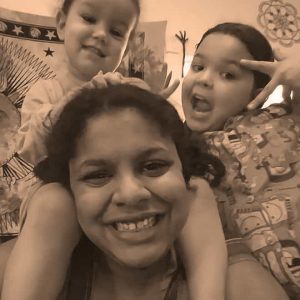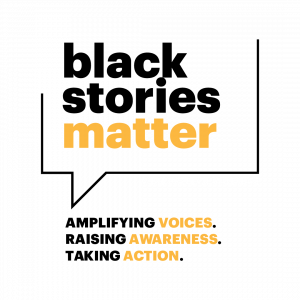Callie (she/her)
Thinking back over her own difficult journey with their racial identity, Callie ponders the question, “How can I help my daughter feel proud of her own blackness?’
#blacklivesmatter #blackstoriesmatter #defendblacklives
I hated black people for a while. I felt they judged me for being me. And I was trying so hard to figure out who I was. Did I need hoop earrings and air force ones to be black? Did I have to to do my hair and nails? Why couldn’t I be black and be the true me?
My 9-year-old daughter recently said to me, “I wish I could be a beautiful black woman, Mommy.” She’s very fair, and I often feel guilty at how relieved I am that she can, “pass.” I want her to be a proud black woman, but I also don’t want her to suffer through what I went through as a black girl, and woman, not fitting in.

I moved to Wilton, CT, an all white town, when I was 8. On my first day of fourth grade, a boy on the bus called me a nigger. I didn’t know what that was, but I knew it was bad. I told my principal, and he was appalled. His response – have me teach the school about Kwanzaa. He wanted me to explain different holidays from “my culture” to a school full of white people. I didn’t even celebrate Kwanzaa.
What was it like being the only black kid? Well, for starters, every day people told me I wasn’t really black. As far as they were concerned, black people were “gangsta” or spoke in ebonics, listened to rap music and wore hoop earrings. My whole life, everyone I knew, convinced me that I wasn’t one of those “homegirls”. They mocked ethnic names, and talked about the “hood”. As far as I was concerned, I wasn’t black either. My mother only had white friends. I only had white friends.
People thought I wasn’t black because I wasn’t that hoop-wearing homegirl. I began to believe that, too. I wasn’t black. I wasn’t white. What was I? I tried so hard to be “white.” I began to hate BET. I wore bell-bottoms and tie-dyes, listened to The Grateful Dead and The Beatles, while still being followed in stores.
When The ABC Kids, nine black boys from inner-cities, came to my high school, suddenly, everyone assumed they would be my best friends. But, they mocked me. The same things that made the white people accept me, separated me from the black people I finally had an opportunity to interact with. The black boys hated me because I was a poser. I wasn’t black. I wasn’t white. But, who was I?
I hated black people for a while. I felt they judged me for being me. And I was trying so hard to figure out who I was. Did I need hoop earrings and air force ones to be black? Did I have to to do my hair and nails? Why couldn’t I be black and be the true me?
Now, many years later, I’m an activist and an organizer for social justice. As a leader, my job is to call people in and help them understand institutionalized or systemic racism. I can do that. I can use my voice and position of power to explain to white people how offensive or hurtful they are. I can explain that their privilege is more than not being called a nigger. It’s feeling safe when going to doctors who aren’t racist toward them. It’s knowing teachers aren’t racist towards their children. I can explain hard things, lead marches, scream into a megaphone, train young leaders and work to create change. And while it’s a challenge, I’m capable of doing these things.
What I don’t know how to do is make my daughter proud of her blackness. How do I make her proud while simultaneously trying to protect her from being pulled over in parking lots and followed in stores? I’m not sure. I guess I still don’t know what being black means, so how do I teach my daughters?

Want More Black Stories Matter Content?
Stories have the power to increase visibility, raise awareness, change people’s hearts and minds, and inspire people to take meaningful action. We are making every effort to ensure all of our Black Stories Matter content is easily accessible, widely consumed, and is accompanied by tools to deepen the impact.
Listen: The TMI Project Story Hour, Season Two: Black Stories Matter, launches this fall. Learn more and subscribe to our podcast HERE
Host: a Black Stories Matter viewing party and discussion from anywhere in the world. Click HERE to learn more and sign up.
Share: TMI Project’s mission with Black Stories Matter is to elevate the underrepresented stories of the Black experience in America – the full spectrum – the triumphs, humor, beauty, and resilience. Click HERE to submit your story to be featured on the TMI Project blog.

2 Comments
Wow, that’s a lot to digest. I’m white,so while I have no clue of what that must feel like, but I can empathize at least to some level. I was once the only white girl in a work dept. of 50+ so I have just a mere taste of that feeling but recently read a book called Some Great Things by Jodi Picoult that deals with racism from many angles and it was a real eye opener for me. Thanks for the great post!
Thanks for this. You’re so modest, it sounds like you know what Black means, being yourself while black. 🙂